Introduction
-
Department of Advanced Materials Engineering
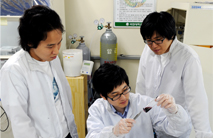
Materials science is the study of the properties and applications of materials. It is a highly multidisciplinary field that encompasses engineering disciplines and basic sciences such as chemistry, physics, biology, and mathematics. It is desirable to complete the graduate courses focused on the research and experiments, so that students can fully understand how the principles of materials engineering can be applied to the industry and undertake highly specialized research projects. The Graduate School of Advanced Materials Engineering at Kookmin University offers extensive opportunities for graduate students to engage in government-funded research as well as joint university/industry research collaborations. These research opportunities help students to grasp how the fundamental understanding of materials science learned from undergraduate studies can be applied and used in leading-edge technology and product development. The Center for Advanced Materials Technology will have received $6 million in research funding for 9 years, since its winning of the University Research Centers Program funded by the National Research Foundation of Korea. Moreover, the Center for Materials and Processes of Self-Assembly has successfully carried out the Global R&D Center Program with the University of Texas at Dallas, and will have received $4 million in research funding for 6 years. With these national research projects, Kookmin University also takes on the university-industry partnership projects with major companies like Hyundai Motors and Samsung Electronics. Students pursuing a master’s or doctoral program will conduct academic research systematically on the cutting-edge research topics under the guidance of faculty advisers whom they would like to work with. All graduate students work as research assistants in the lab and receive tuition fellowships or other forms of scholarships from research funds. The Graduate School of Advanced Materials Engineering at Kookmin University is publishing top-notch research journal articles and patents, and is drawing considerable attention from relevant fields both domestically and internationally After completing a degree, students can pursue their chosen career in nearly all engineering fields including steel, automotive, semiconductor, display, info-communications, environmental/energy, and bio/medical industries. In addition, some students get admission from world-renowned university graduate programs or post-doc research programs for their post-graduate studies.
-
Department of Mechanical Engineering
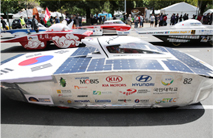
The Department of Mechanical Engineering has graduate programs leading to the M.S. degree and Ph. D. established in 1979 and 1983, respectively. The joint M.S.-Ph.D. program is being offered as well. The more than 20 year history and tradition of the department has archived the academic and technical development in mechanical engineering and other fields such as the heavy industries, shipbuilding industry, aerospace engineering and automotive engineering, in which the M.S. and Ph.D. graduates are actively working as engineers or research faculties. The research carried out in this department is based on thermodynamics, which deals with the energy and energy conversion, fluid mechanics, which enables flow visualization and design of air flowing systems, and heat transfer, which is relevant to the heat exchanger selection and thermofluid device design. The outcomes of the basic research are applied to real engineering problems resulting in the improvement of the technologies of design, manufacturing and automatic control. Moreover, it is now attempted to give the latest materials on the micro thermo‐fluid field in connection with MEMS, NT (nanotechnology), and BT(biotechnology). The department aims to prepare students for professional practice in an era of rapidly advancing technology by providing them with basic principles in mechanical engineering, design practices and latest trends and developments, which enable interdisciplinary research. The department offers basic courses, such as thermodynamics, fluid mechanics, and heat transfer. Other courses are also given to the students covering turbo‐machineries, internal combustion engines, automobiles, refrigeration and air conditioning systems, as well as automatic control systems so that optimal design, economic manufacturing and production are practiced in a creative and efficient way. Especially, hands‐on experiences are encouraged by providing laboratory facilities and experimental setups: and the opportunities of engineering practice are offered through the participation in the co‐work between the department and industry.
-
Department of Mechanics and Design
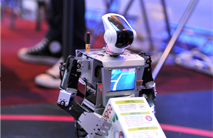
Graduate programs leading to the degrees of M.S. and Ph.D. in Mechanics and Design were established in 1987 and 1991, respectively. The joint M.S.‐Ph.D. degree program is also being offered. The broad fields that are covered involve fundamental mechanics of solids, materials design for machine elements, reliability and optimization, fracture and fatigue, computer‐aided design, and manufacturing. By completing the curriculum, students are able to acquire practical design abilities that can be put to use in the diverse field of engineering. Graduates from our Department of Mechanics and Design have been directly involved and played essential roles in almost all fields of engineering including Mechanical and Design industry, Production industry, Environmental and Energy industry, Electrical/Electronics industry, and so on. The Department of Mechanics and Design is now supporting up-to-date technologies in interdisciplinary areas such as Nano/biotechnology, MEMS, Biomedical engineering, and Robotics area, where our graduates can also have opportunities to become valuable assets in those fields.
-
Department of Civil and Environmental Engineering
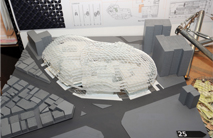
Civil and Environmental Engineering plays a very important role in the harmony between nature and human activities. The field of study includes the construction of highway, multi-purpose dam, bridge, tunnel, subway, harbor, airport, etc., and the analysis of flood, drought, traffic system, water quality, environmental problem, etc. The faculty consists of the most renowned scholars and engineers in the Civil and Environmental Engineering fields and it offers graduate program to educate and train experts through graduate courses and research activities with industrial-educational projects and wide array of laboratory equipments. The graduate program has master’s and doctoral programs and the program is composed of four major tracks, structural engineering, geotechnical engineering, water resources engineering, and environmental engineering.
-
Department of Electronics Engineering
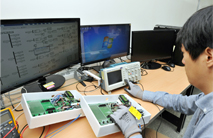
Department of Electronics Engineering has been offering one of the most compre- hensive research and instructional programs, after initiating Master’s and Ph.D. degree programs in 1988 and 1992, respectively. Each year, a large number of students more than 30 succeed in their degrees. Currently, we have 32 members of faculty and 24 laboratories: Broadband Communications Laboratory, Communication Convergence Laboratory, Computer Engineering Laboratory, Control Systems Laboratory, Convergence Bioelectronics Laboratory, Information and Control Laboratory, Integrated Circuit Design Laboratory, Integrated Systems Laboratory, Intelligent Robotics Laboratory, IT Security and Privacy Laboratory, Multimedia Communication Signal Processing Laboratory, Multimedia Laboratory, Multimedia Signal Processing Laboratory, Nano Devices and Systems Laboratory, Network Computing Laboratory, Power Electron Systems Laboratory, Power Electronics Laboratory, Power Electronics System Laboratory, Semiconductor Devices and Integrated circuits Laboratory, Smart Embedded System Laboratory, Smart Grid Laboratory, Ubiquitous Convergence Technology Laboratory, Wireless Network and Communication Laboratory, Wireless Sensing Laboratory. The department’s close ties to industry, coupled to its commitment to engineering research and education, ensure that every student explores his/her professional carrier in the government, research centers, and venture companies. The goal of the graduate school of electronics engineering is to produce highly trained, competent electrical, electronic and computer engineers, researchers, and scholars to meet the needs of our fast-changing industrial and information society. The areas of active research program and related graduate courses include: Control and Instrumentation, Microwave Engineering, Circuits and Systems, Communication Engineering and Systems, Digital Signal Processing, Computer Engineering, Integrated Circuit Design, Semiconductor Devices, Robotics, Electric Power Systems, Wireless Communication Systems, Microwave and RF Circuits Design, Digital Signal Processing, Speech and Image Processing, Computer Architecture, and VLSI System. There are two majoring programs: the Electronics Engineering program and the Microwave Communication Engineering program.























